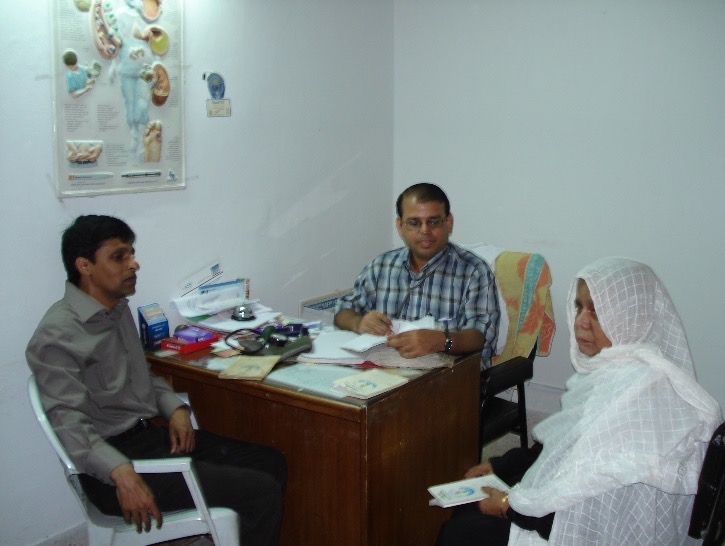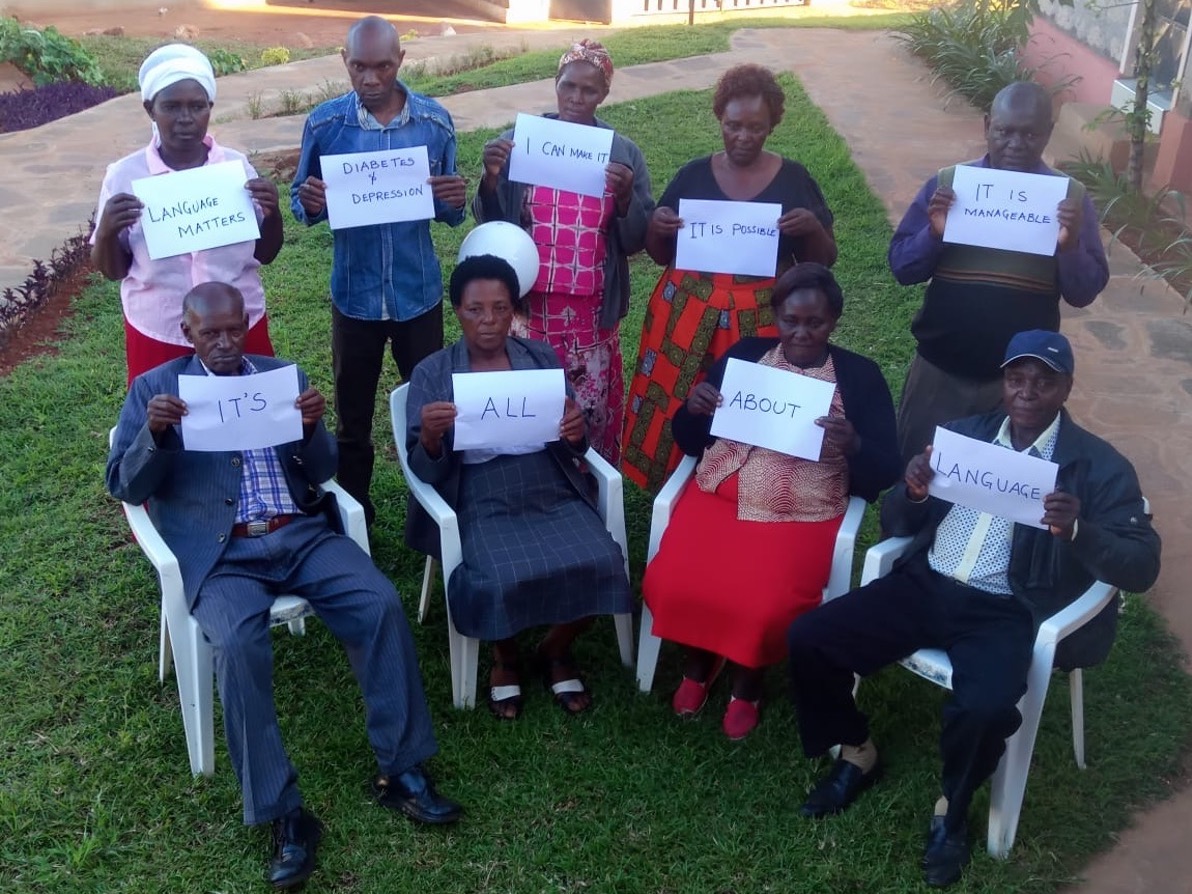You are here
- Home
- Research
- Impact
- Research Excellence Framework
- Discussing diabetes without judgment
Discussing diabetes without judgment
People with diabetes can feel stigmatised if the doctors and nurses they talk to use judgemental language about their condition. It can even cause a breakdown in trust and communication between professional and patient that may prevent those with diabetes from getting the help they need. Cathy Lloyd explains how her research has created a greater awareness of how negative language affects people with diabetes, how it has led to the development of a series of language guidelines for healthcare teams that supports the mental and physical wellbeing of people with diabetes.
A person with diabetes once said to me: “If a medic in a hospital wants to force a patient to accept treatment against their will they just speak in an authoritative tone and feign exaggerated shock or disapproval of the patient’s choice of treatment or non-treatment. This needs to stop.”
I had to agree. If the attitudes of some doctors and nurses, and the language they choose to use, is actually alienating the person with diabetes, and perhaps even preventing them from accessing the right care, something needed to be done.
Since 2000, I’ve collected a large body of research on the psychological wellbeing of people with diabetes. This research has shown me just how important the appropriate use of language in clinical encounters can be in supporting the mental health of people with diabetes and giving them the confidence to manage their condition. It also showed me that the use of inappropriate language can actually cause a breakdown in communication and make the person with diabetes feel stigmatised and powerless. To help give people with diabetes the right care, I wanted to define a language for doctors and nurses to use that enables people with diabetes to speak freely, without feeling that they or their condition are being judged.
Choosing language that is culturally appropriate
Part of my research specifically looked at the importance of culturally appropriate language in helping people with diabetes self-manage their condition and maintain their emotional wellbeing.

A picture taken during our field research in Bangladesh
In 2005, and again in 2011, Diabetes UK funded me to conduct research in an urban area of the UK that contained a high proportion of people from ethnic minority backgrounds, as well as high levels of deprivation and low literacy levels, and where as many as 6,000 individuals attended diabetes clinics.

Research was conducted in an urban area of the UK that contained a high
proportion of people from ethnic minority backgrounds.
Through focus groups and rigorous pilot testing with people from Pakistani and Bangladeshi backgrounds, I developed culturally appropriate ways to assess the emotional status of people with diabetes, from the presence of any depressive symptoms to their overall wellbeing.
In practice, this began with the development of culturally appropriate questionnaires to assess the person’s depressive symptoms and their confidence in managing their diabetes. The questionnaires raised awareness of the need for healthcare professionals to initiate more productive conversations that could identify the kind of psychological and emotional problems that might have a negative effect on wellbeing or diabetes self-care.
In 2012, I was invited to collaborate on research among minority ethnic groups from Bangladesh, Pakistan and India living in the UK with varying literacy skills to find out how satisfied they were with the clinical encounters they had with their GPs. The research showed that satisfaction was improved when people with diabetes were able to communicate with their doctors in a South Asian language.
How the work has improved healthcare practice
I’m proud to say that my work has helped define a language that has improved not only practice but also policy and made a positive difference for people living with diabetes.
In 2017 I was invited to join a newly founded NHS England Working Group where my work contributed to the creation of a document called Language Matters, which recommends appropriate language for doctors and nurses to use when talking to people who have diabetes. For example, it shows more empathy to use a phrase such as “It sounds as though your diabetes is really hard to manage at the moment,” than a phrase such as “You’re in denial”, which is likely to alienate a person with diabetes. Doctors and nurses have said that these recommendations have made them more sensitive and understanding in their approach those with diabetes.
It’s increased my sensitivity in this area as well as given me ideas on how to make a difference.
A consultant clinical psychologist, working with adults with diabetes, commenting on Language Matters.
Healthcare teams are still discovering and using the new recommendations to improve care. A specialist diabetes dietitian working in an NHS Trust I spoke to said that during a new virtual education programme developed in lockdown her team received feedback that the participants felt judged and blamed. The team then discovered the Language Matters document, circulated it within the practice and began using it in their efforts to be more empathetic and non-judgmental when talking to people with diabetes. One member of the team said: “Awareness of language in diabetes has helped to create an even greater awareness of language in everyday life and its potential to damage or upset, especially at the moment with Covid”.
The words we use with people with diabetes are pivotal to shaping their behaviours and it’s our duty and responsibility as healthcare professionals to use language that makes people understand their chronic condition and therefore help improve their lives. Language does indeed matter.
Prof. Kamlesh Khunti, professor of primary care (Diabetes), University of Leicester.
Positive change beyond the UK - and beyond diabetes
The Language Matters recommendations have now been endorsed by the president of the International Diabetes Federation and have been translated into Tamil, Hindi, Spanish and French. This work has been led by Dr Partha Kar and Jazz Sethi, who has type 1 diabetes and works in India.
The recommendations have also helped improve healthcare beyond diabetes. I want my work to change as many lives as possible, and so as my work has moved to other countries, I’ve seen that it can be used to improve the provision of other types of care, such as mental health care. Recently we launched the Community Intervention Network for Diabetes and Depression (CoIN-DD) and, working with my colleagues in Kenya, I have adapted the NHS Language Matters recommendations for use there, where there are problems in the use of language to describe not only diabetes but also depression.
The aim is to raise awareness and reduce the stigma surrounding these two conditions, so as to increase access to, and satisfaction with, appropriate services, and improve psychological wellbeing for people with diabetes or depression. My consultations with community members showed that there was a great need for this, and that there was wide support for the development of information leaflets which could raise awareness and reduce stigma.

Community members in Kenya send a message that language matters
It changed the way I use language
It’s been so rewarding for me to see the impact of my work benefiting care for other conditions. The philosophy of the Language Matters Group has been taken onboard by Obesity UK, who have since published new guidance on the language that should be used when talking to people who are obese or over-weight. And an incoming policy research officer for the European Association for the Study of Diabetes said the philosophy was “explained and encouraged from day 1” and that, for him, it “changed the way I use language around chronic diseases both professionally and in my personal social life.
The point of all this research is to improve conversations and help improve care and so it is always rewarding for me to hear how it has worked in practice. A diabetes specialist nurse has reported that, as a result of the work, she started noticing that changes in the way the questions were worded were making a difference to the responses of those with diabetes: “They feel more heard and less judged,” she said. “They will discuss more about what issues they have, much more than just saying, ‘I know I am overweight, and I need to lose it’. It seems to open the conversation up properly.
Opening up a conversation without judgement is always the best way to address a problem, and in healthcare it is the first step of the journey towards greater physical and mental health and wellbeing. Prof Cathy Lloyd, Professor of Health Studies, 1998-Present, The Open University, Allied Health Professions, Dentistry, Nursing and Pharmacy
More about Language Matters
Language Matters has been promoted in several ways to make sure its words reach as many healthcare professionals – and, ultimately, people with diabetes – as possible. It was launched:
- At the annual Diabetes UK Scientific conference which is attended by thousands of healthcare professionals
- Through the NHS England website (where hits in the first week were over a thousand, making it the most downloaded document that week)
- Through the Clinical Commissioning Groups
- Through several webinars
Webinars
Language Matters: Supporting Emotional Health in Diabetes Care
Healthcare Professional Webinars
The following webinars were all aimed at healthcare professionals, the first being part of a series of CPD events aimed at diabetes and endocrinology doctors who were members of the Association of British Clinical Diabetologists.
Language Matters: the impact on people with diabetes
The challenges of delivering person-centred care in a virtual world
Supporting people experiencing diabetes-related distress
Further resources to support language use in clinical encounters with people with diabetes.
And recently, along with two people with diabetes, I promoted the use of appropriate language in clinical encounters through a contribution to a special Cochrane series of blogs (Authors: Cooper A. Swindell B, Lloyd CE), which discussed the impact language can have on people who live with a long-term condition, including tips for healthcare professionals on how to choose helpful and appropriate language.
Research enquiries
For research enquiries email:
WELS-research-admin@open.ac.uk
For student and degree enquiries email:
WELS-student-enquiries@open.ac.uk
Events
Designing, doing and reviewing IPA social work research - SWIPA Summer Workshop (Edinburgh)
Thursday, June 26, 2025 - 10:00 to 15:00
Edinburgh, The Open University in Scotland
Contact: SWIPA Team
British Association of Social Workers Workshop
Tuesday, July 8, 2025 - 08:30
